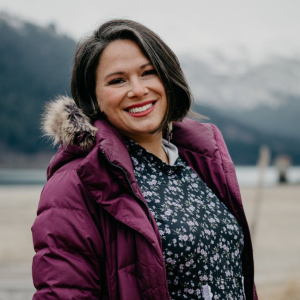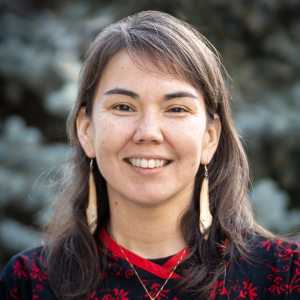- Need Technical Assistance? akchild23@getvfairs.io
where the theme is "Working Together for the Safety, Permanency, and Well-Being of Alaska's Children."
This conference seeks to improve our knowledge and skill in providing child welfare services in Alaska. Our audience is focused on four important groups: OCS employees, resource families (foster, adoptive, and kinship care families), tribal members (ICWA workers, tribal social services, tribal court personnel), and child advocates (GALs and CASAs). We all hold a piece in our State’s response to keeping children safe and have crafted the conference to hear those different voices and look at child welfare through different lenses.
Each day will start with an all-conference plenary, followed by a choice of three concurrent workshops in the morning, and three concurrent workshops in the afternoon. For the concurrent workshops, you do not need to pre-select which one to attend. You may freely select which one to attend live on the day of the conference and watch the other two recorded workshops at your own convenience. We will end each day with a thought-provoking panel, grappling with a challenging question and offering a chance to look at these challenges through the different lenses of our participants. This conference is presented virtually, so wherever you are in Alaska, we invite you to participate.
There are the themes for each day:
 9 AM - 10:15 AM
9 AM - 10:15 AM
Alaska Council on Domestic Violence and Sexual Assault
Join us for an insightful keynote session focused on safety and the transformative journey from being trauma-informed to becoming trauma-responsive and ultimately centering healing in our lives and communities. We will explore the concept that healing is always present, influencing every conversation, email, meeting, and gathering, and delve into how we can acknowledge harm and its impacts while also embracing the tools and possibilities for healing. Participants will learn to cultivate acute awareness of how interactions and narratives affect physical and emotional well-being, drawing on stories and actives that teach awareness, reflection, and physical and emotional regulation. By participating in this session, listeners will not only learn valuable insights but also feel empowered and active in their personal and community healing journeys.
 10:30 AM - 12 PM
10:30 AM - 12 PMKim Guay, Director of OCS; Kim Swisher, Deputy Director of OCS; Barbara Cosolito, Social Services Program Officer
OCS will cover current and future initiatives to improve the foster care licensing program. This includes the creation of additional supports to foster parents and future plans for the program. A highlight of the presentation is the importance of foster parent voices, the feedback to OCS is critical.
 10:30 AM - 12 PM
10:30 AM - 12 PMAlaska Center for FASD
The Alaska Center for Fetal Alcohol Spectrum Disorders produced 8 Keys for Adults with FASD, to highlight how FASD impacts adults. The documentary film features seven self-advocates who experience an FASD sharing their stories and the strategies that help them to be successful living with this brain-based difference. The film will be shown with presentations by several of the featured adults to talk about how to understand adults impacted by FASD.
 10:30 AM - 12 PM
10:30 AM - 12 PMKristen Moore, OCS Medical and Mental Health Unit
Youth are coming into care with increasingly complex situations and behaviors. With limited services and waitlist, getting early assessments and using the community resource available to us plus using "outside the box" approaches can help us intervene earlier and more effectively.
 12 PM to 1 PM
12 PM to 1 PM 1 PM to 2:15 PM
1 PM to 2:15 PMMindy Swisher and Sandra Dehart Mayor, OCS
1. Provide an overview of the Ericksen Institute Facilitated Attuned Interaction (FAN) model, specifically for supervisors. 2. Share information on how OCS adapted and implemented the Supervisor FAN model into the agency and the benefits associated with the model. 3. Provide information on the evaluation process and lessons learned including the next steps with the FAN rollout.
 1 PM to 2:15 PM
1 PM to 2:15 PMLisa Wade, Chickaloon Village Traditional Council
This workshop will explore the methods utilized by Chickaloon Village Traditional Council's ICWA Program, Tribal Police Department, and Traditional Tribal Courts working together to create a coordinated response to child protection.
 1 PM to 2:15 PM
1 PM to 2:15 PMShontey Hambrick and Rodreshia Dunbar, OCS
The Alaska Tribal Child Welfare Compact is a government-to-government agreement between the State of Alaska and certain Alaska Native Tribes and Tribal Organizations. It seeks to increase the capacity of Tribal governments to provide child welfare services to their Tribal children and address the racial disproportionality of Alaska Native children in State custody. Join staff from the Tribal Compact Referral Unit to find out the nuts and bolts of how OCS is engaging, referring, and working with tribes to implement the Compact.
 2:30 PM to 4 PM
2:30 PM to 4 PMLegal Parties
Our end of the day panels will focus on the question, "What is in the Best Interest of the Child? What guides your decisions and actions?" In our first day panel, we pose this question to the legal parties to the case including OCS, tribes, and public defenders working with the children and families.
 9 AM - 10:15 AM
9 AM - 10:15 AM
Dr. Ullrich will share what has been learned across multiple research projects about Indigenous connectedness and relational well-being. This research could be informative for transformative change at multiple levels of the child welfare system. As a result of this presentation, the hope is for attendees to walk away with tangible ideas on how to support relational well-being within their personal lives and professional practice that lead to improved outcomes for children, families, communities, the Earth, and future generations.
 10:30 AM - 12 PM
10:30 AM - 12 PMBrenda Ursel, Adoption Support Specialist, Alaska Center for Resource Families
Do you feel like you are navigating your adoptive parenting journey just trying to avoid opening up a mine you didn’t know was there? Then, you level up to the teen years, where the mines are even more frequent, fragile, and volatile. You never know when or where a mine will be hit or what its full impact will be. Unfortunately, this is a reality for many adoptive families and children who are held captive trying to avoid any missteps that will ignite a hidden mine. What if…
You had a map showing where the land mines are buried so you could avoid them? What if you knew how to diffuse the mines before they exploded? What if you learned ways to prevent the mines from being buried in the first place?
In this session, families will learn how to safety plan, access support and services to help them navigate, and prepare and prevent hitting common adoptive landmines associated with the core issues in adoption.
 10:30 AM - 12 PM
10:30 AM - 12 PMMartin Irwin, MD, Clinical Professor, Child and Adolescent Psychiatry
NYU Grossman School of Medicine
Multiple studies have concluded that children in foster care, many of whom are victims of abuse and trauma, are prescribed psychiatric medication at a rate significantly higher than other populations of children. Much of the time, the medications are used to control behavior and anger. Many of the medications used in this population of already vulnerable children are prescribed off-label, with little proven benefit but significant risk. Compounding the problem, biological parents or legal guardians are frequently pressured to sign consents forms without having ever spoken to the psychiatric provider. The consent forms parents or guardians are asked to sign do not contain sufficient information about benefits, risks or alternatives to allow them to make a true informed decision about the psychiatric care of their children. When parents refuse to consent, even if their objection is reasonable, the medications are often administered over their objections.
Child advocates, attorneys representing parents and children, family court judges, state child welfare leaders, caseworkers, educators and mental health therapists can play a vital role in reducing the overuse of medication. The discussion will explore the causes of overmedication, the “red flags” that can help them recognize situations where the child’s treatment with psychiatric medications may be problematic or parents objections should be honored and possible solutions
 10:30 AM - 12 PM
10:30 AM - 12 PMJudge Debra O'Gara and Josh Ahsoak, Alaska Native Justice Center
Learn more about what it takes to be a QEW—Qualified Expert Witness. The Qualified Expert Witness is used in ICWA cases and is a person who should be qualified to testify about the social and cultural standards of the child's Tribe and can assess whether the removal of a child from his or her family in a particular case is consistent with those standards. The state is required in many ICWA hearings to call a qualified expert witness to validate the state social worker’s decision to remove or terminate, looking at the risks to the child if returned home.
 12 PM to 1 PM
12 PM to 1 PM 1 PM to 2:15 PM
1 PM to 2:15 PMDawn Adams OCS Southcentral Regional Permanency Specialist, and Jessica Veldstra, PSSII, Kenai Rural SCRO
Legal Guardianship is a Permanency Goal that is increasingly being considered. What goes into a legal guardianship? How is it different than adoption and when might it be appropriate as a permanency goal? This workshop will answer these questions with the goal of understanding when and how guardianships may (or may not) be appropriate.
 1 PM to 2:15 PM
1 PM to 2:15 PMDawn Paulson, Family Support Director, Beacon Hill; Jessica Clarkson, R.O.C.K. Mat-Su; Desire Shepler, CEO and President, Alaska Family Services; Kim Swisher, LMSW, Deputy Director, OCS
Quality family contact is linked to improved child well-being and permanency outcomes for children in out-of-home care. While State child welfare is involved, parents deserve to have a meaningful experience with their children. The Family Contact Improvement Partnership (FCIP) is a group of organizations, agencies and community stakeholders committed to improving family contact for children who are in out-of-home placement. This workshop will highlight the impact of a cross-sector approach to serving families and the opportunity to open funding streams to improve outcomes for children in care. Integral to this approach is the emphasis on investing in relationships and for state child welfare (Office of Children’s Services) to be willing to accept the help knowing the system is unable to strengthen families alone.
 1 PM to 2:15 PM
1 PM to 2:15 PMTami Eller, Facilitator, and Panel of Providers
In January 2018, Alaska applied to the Centers for Medicare and Medicaid Services (CMS) for approval of an 1115 behavioral health waiver at the direction of the Alaska Legislature through SB 74. The intent is to create a data-driven, integrated behavioral health system of care for Alaskans experiencing serious mental illness, severe emotional disturbance, substance use disorder (SUD), co-occurring substance use and mental illness, and at-risk families and children.The waiver provides flexibility to offer a broad range of substance use disorder and behavioral health services and reduce Alaska’s reliance on crisis services. This workshop explores how it is being applied and features several agencies speaking to how they are using waiver funds to provide services.
 2:30 PM to 4 PM
2:30 PM to 4 PMSuperior Court Judge Yvonne Lamoureux, Bethel Superior Court Judge Nathaniel Peters, and Palmer Superior Court Judge Jon Woodman
Our end of the day panels will focus on the question "What is in the Best Interest of the Child? What guides your decisions and actions?" In our second day panel, we pose this question to state judges to talk to us about the frameworks and laws that guide their decisions on child welfare matters.
 9 AM - 10:15 AM
9 AM - 10:15 AM
Do you remember how you felt when you first began this work? You were ready for the challenges ahead and eager to jump in with a helping hand. If you’ve felt that motivation waning, you are not alone! In the face of stress and trauma, the brain can go into “survival mode.” Take some time to get your spark back! We will put neuroscience in practice to renew your passion and refresh your weary heart and mind.
 10:30 AM - 12 PM
10:30 AM - 12 PMAlana Medel, Facilitator of Panel
A variety of service providers will address the situation of referring families to services in a sensitive and effective way so families are supported in going into services, rather than feeling confrontive or resistant. How can OCS facilitate the "warm handoff" that encourages the families and sets them up for success with the service provider? This workshop features a series of services providers (for example, RCPC, ILP, ACRF) who are receiving referrals from OCS and be led as a panel discussion by Alana Medel.
 10:30 AM - 12 PM
10:30 AM - 12 PMCharity Carmody, Alaska Impact Alliance
Find out the current initiatives of Alaska Impact Alliance (AIA).
 10:30 AM - 12 PM
10:30 AM - 12 PMTami Eller
 12 PM to 1 PM
12 PM to 1 PM 1 PM to 2:15 PM
1 PM to 2:15 PMLinda Saling
Attachment styles influence how parents facilitate attachment with their children. Many parents whose children are in the State's custody have insecure attachments making it difficult for them to facilitate a healthy attachment for their children. An adult can heal their attachment style to move from an insecure attachment to an "earned secure" attachment, allowing them to facilitate secure attachment within their children. This presentation will explore the four different attachment styles, how they present in adults, and how Trust Based Relational Interventions can support healthy, secure attachment.
 1 PM to 2:15 PM
1 PM to 2:15 PMTaylor Feightner, MSW Co-Executive Director: Programming; Chami Krueger, BSW, PSPI Matsu Navigator
The LGBTQIA+ Competency in Service Provision program is a comprehensive and inclusive training initiative aimed at enhancing service providers' knowledge, skills, and sensitivity to better meet the unique needs of LGBTQIA+ individuals. This workshop seeks to foster a more affirming and supportive environment for LGBTQIA+ individuals accessing various services, including healthcare, education, social services, mental health, and beyond.
 1 PM to 2:15 PM
1 PM to 2:15 PMChristine Schut, Foster Care Liaison, Fairbanks Northstar Borough School District
An open discussion on successful and less than successful Family Engagement activities and events for Foster Care families in the school district. Focus topics include staff capacity, community support of events and activities, and connecting both foster and bio families to resources through a Family Engagement Center.
 2:30 PM to 4 PM
2:30 PM to 4 PMLived Experience Panel
Our end of the day panels will focus on the question "What is in the Best Interest of the Child? What guides your decisions and actions?" In our final panel, we pose this question to the people most impacted by the child welfare system: persons with lived experience including youth, birth parents and resource families.
This conference is sponsored by UAA Child Welfare Academy, Alaska Center for Resource Families, and Alaska CASA Program with support from Alaska Department of Family and Community Services, State of Alaska Office of Children's Services, State of Alaska Department of Health OSMAP FASD Program, Alaska Children’s Trust, Court Improvement Program, Beacon Hill, Office of Youth Empowerment, and Facing Foster Care in Alaska.
Click on each logo to be directed to the sponsor's site.